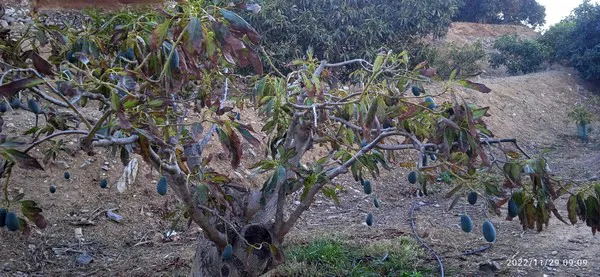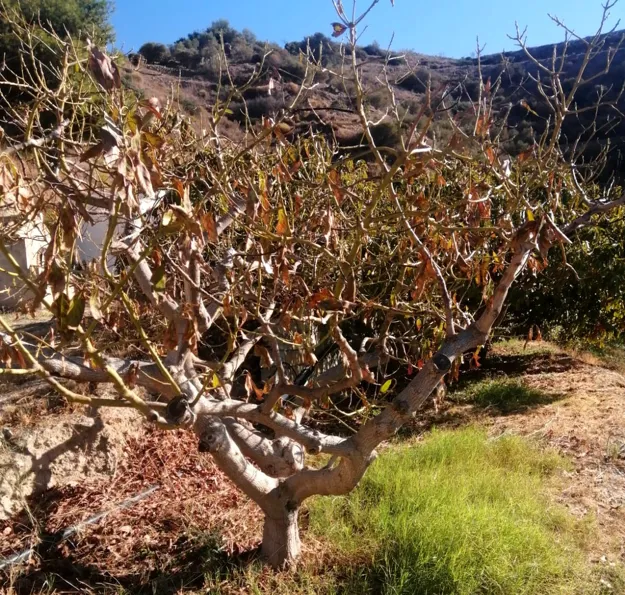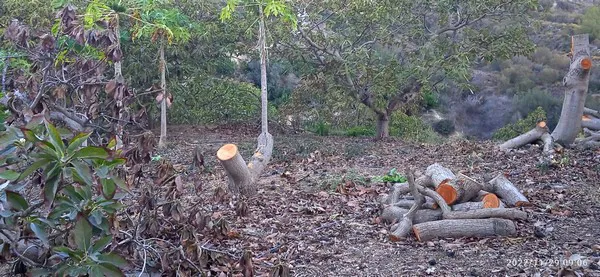There is great concern about the lack of water in eastern Andalusia as the figures confirm that the agricultural sector is experiencing an exceptional situation. In the province of Granada, in particular, the month of October - in which there usually is an important amount of rain that helps recharge aquifers after the stress of summer - has been exceptionally dry, recording only 2% of rainfall compared to the average values for that month, while evapotranspiration intensified in what has been the warmest October since 1961.
In Almuñecar, the agricultural sector is facing a desperate scenario as the aquifers have reached critical levels after several years of insufficient rainfall, 'administrative laziness', and the pressure on very depleted water resources, stated Francisco Garcia, a farmer from the region.

"The aquifers have been salinated by the lack of rains and because they haven't been recharged, as we've asked the administration for years to avoid what is now happening: that the main aquifer is salinated affecting all the wells that supply the irrigation communities. No one understands why the pipes to distribute the water of the Beznar and Rules dams have not been made 20 years after the dams, which required a huge investment, were constructed."
“Now the city council has finally announced that it is going to recharge the aquifer, but it is too late,” Francisco stated. "It has so much salt, that it's very possible that the amount of water they put in it won't lower its salinity levels to make it optimal for irrigation."

"The country's bureaucratic administration and the large number of departments that pass the buck to one another prolongs all processes to the point that, when they finally decide to do something, it's no longer effective," he lamented. "At this point, what we need is that they declare an emergency in the area so that they can immediately carry out all the actions to try to solve this issue. Farmers have already run out of time."
“The landscape in Almuñecar is deteriorating day by day. Some farmers have already pruned their plantations. They cut the fruit trees to half a meter high leaving them with several branches to try to save them by forcing them to fall into some kind of hibernation. However, if they survive, they would only start producing fruit again in 2 or 3 years. Others have directly decided to abandon the plantations to their fate.”

"The remaining of us are doing chemical treatments to try to help the trees overcome the salinity of the water, but the plants are saturated and are suffering great water stress. They are becoming weaker and are more exposed to diseases, such as regressive death."
"We are talking about more than 3,000 hectares of subtropical crops that account for 50 to 60% of the region's income"
That's why Almunecar's agricultural sector, with the support of the people from the municipality, will hold a 12-hour strike and protest in front of the municipality on December 14. The sector's goal is to make its situation visible and the need for a solution on an administrative scale. “Everyone we talk to tells us that they support us, and we want everyone, regardless of their political inclinations, to join us on the 14th. This is a problem that not only affects agriculture; it is an economic and social problem: this year we will have economic losses, but next year there may simply be no income."
"We are talking about more than 3,000 hectares of subtropical crops that account for 50 to 60% of the region's income and some 8 to 9 thousand families who live from this activity."

“The situation is serious enough to declare a state of emergency. The problem currently affects Almuñecar, but it is spreading like gunpowder all over the coast of Granada,” Francisco stated. "I'd like to think that we can still save those thousands of hectares of tropical crops and that the technicians of the Board or the Central Government, or even companies related to the sector, will be able to find an effective, urgent, and economically viable solution to guarantee water. This is a problem that affects all of us, not only irrigators. If the underwater pipes that supply fresh water to the population of Almuñecar experience a problem, the only water available in the aquifer is salinated and would not be suitable for drinking."
"According to the latest laboratory analysis that I performed on my well, its water has a conductivity of more than 7,100 µS/cm, more than 2,100 mg/l of chlorides, and 780 mg/l of sodium." As a reference, the parameters of water for human consumption in Spain stand at 2,500 µS/cm, 250 mg/l of chlorides, and 200 mg/l of sodium.
For more information:
Francisco García
Tel.: +34 671 67 01 35
platerogarcia@hotmail.com
